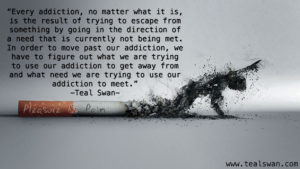
Addiction is the Escapism of Sin
Behind the Scientism of Medicine
Addiction is a billion dollar industry that adds additional behaviors under its guise of applying scientific means to control these so-called addictive behaviors. The American Psychiatric Association (APA) in its Diagnostic Statistical Manual (5th Ed.) defines addiction as, “Addiction is a complex condition, a brain disease that is manifested by compulsive substance use despite harmful consequence. People with addiction (severe substance use disorder) have an intense focus on using a certain substance(s), such as alcohol or drugs, to the point that it takes over their life.” Later in the same article other forms of addiction are listed having nothing to do with substances: gambling and internet gaming for instance. The American Society of Addictive Medicine (ASAM) defines addiction as, “Addiction is a treatable, chronic medical disease involving complex interactions among brain circuits, genetics, the environment, and an individual’s life experiences. People with addiction use substances or engage in behaviors that become compulsive and often continue despite harmful consequences.” Notice the key words in both definitions that removes responsibility for addiction from the individual: compulsive, chronic, medical disease, etc. Recidivism rates are so high that one cannot find reliable figures but instead find doublespeak terms that elude precise figures to hide the dismal failure of so-called rehabilitation treatment programs. In other words, there is little hope though there are a great many expensive programs touting a scientific rationale for its treatment approach; i.e., scientism. Nearly all of these programs eschew faith as the appropriate weapon for the ever mounting list of addictive behaviors forcing most churches to funnel their so-called addictive members into these failed programs. The implicit message: The Bible does not work.
The 19th century doubled-down on the systematic approach to all issues at the expense of rejection of biblical explanations begun in the Age of Enlightenment. By the 1840s science had separated from philosophy, previously known as natural philosophy. The application of the scientific methodology, measurability and repeatability {empiricism}, was being applied to many issues that were non-empirical such as forms of government, creation, psychology, and sociology to name a few. Marxism was simply the attempt to defeat free market economics through the application of so-called science to a return of medievalism via the doublespeak of equality of the masses. This forced application of empirical science methodology to non-empirical disciplines has become known as scientism. Scientism is the attempt to legitimize one’s conclusions via dubious methodologies in order to appear as science and gain the acceptance of the general population. This was supported by both the newly formed, and forming, nation-states which needed a means to advance their ever centralizing power over the growing newly forming middle class and the intellectual class which sought its own power over both government and society for economic benefit. These growing power elites had to discredit biblical faith which defined man’s problems and sin and the new covenant gospel as the cure. Germanic higher criticism was the first attempt to apply scientism to biblical textual criticism to discredit the Scriptures. Though initially successful, it was beaten back by its own flaws and the populations embracement of the true gospel. However, by the early 20th century new scientism philosophies such as the Social Gospel movement began making serious inroads via radio and later television mediums. But, something happened that no one was expecting; man’s sin nature would not be suppressed by the empty so-called truths of scientism. Sin became stronger as people’s understanding of the gospel weakened. These unsuppressed sinful behaviors became labeled as addictions to more easily apply scientism explanations and coverup their true origins.
Paul wrote that, ““All things are lawful for me,” but not all things are helpful. “All things are lawful for me,” but I will not be dominated by anything.” (1Co 6:12). Within the context of this verse Paul was referencing both food and sexual immorality {today known as food and sexual addictions}. Later in the same book Paul repeats his statement, ““All things are lawful,” but not all things are helpful. “All things are lawful,” but not all things build up.” (1Co 10:23). Notice, Paul is talking about behaviors that are inherently lawful but have gotten out of control via one’s fleshly sin nature; even for the saved! Two thousand years ago God, through Paul, states that what we call addiction is simply the sinful out of control expressions of the flesh. This was a common view until the mid-20th century when the scientism of psychology/psychiatry began their propaganda campaign of defining addiction as a medical and therefore scientifically treatable disease! This active campaign castigated the biblical truth that each person is responsible for his, or her, own behavior by substituting the belief that physical or genetical influences were the cause of the addictive behaviors. Thus, only medicine could successfully treat these non-sinful but destructive behaviors. Churches with their biblical-counseling programs became irrelevant while so-called Christian counseling programs rose up to take their place. The fact that their methodologies were in-line with secular treatment methodologies belied their biblical approach. The poor success rates of curing addictive behaviors coupled with high recidivism forced these scientism approaches to admit addiction cannot be cured, only controlled {barely}.

Overcoming Addiction is Impossible
Without a Faith Component: Wrong Diagnosis
Early addiction programs recognized the necessity of a faith component but advocated any faith rather than biblical faith. They were supported by Roman Catholicism and mainline Social Gospel Protestant churches who had long-ago abandoned the true Gospel. This left the sin nature intact to find expression in any behavior open to that individual. The only thing addictive behaviors have in common is the methodology of the fleshly nature. The flesh cannot be redeemed; it can only be controlled by the indwelling Holy Spirit (Ro 8:5-10; Ga 5:16-17). This means those without salvation; the New Nature, have no hope; the flesh will always control them in some manner (2Co 5:17). Those who are saved have hope if they do not grieve the Spirit but allow the Spirit to work through them to control their flesh! One can determine one’s ongoing spiritual state by which behaviors are being expressed (Ga 5:19-25).
So, why do addictive behaviors have a spiritual, or psychological as some would believe, component? Each person has an internal witness to correct moral behavior being made in God’s image (Ro 1:18-23). Each person comes under conviction when violating the internal witness to true morality (Ro 2:13-16). This results in guilt, a warning that one is violating God’s morality. the solution is to humble one’s self to God, accept His salvation and obtain peace with Him (Ro 5:8-11). But, when one suppresses the guilt one seeks to justify sinful behaviors. These gain potency via the flesh to control the mind and squash guilt. Thus, these behaviors are the sinner’s, saved and lost, attempt to legitimizing sin but result in enslaving the individual who refuses to repent and seek God’s forgiveness. For the Lost: God allows them to immerse themselves in their sinful, addictive, behaviors (Ro 1:24-25). The only peace they will know is a seared conscious, no guilt and thus no guidance for one’s behaviors. The saved will be taken to the woodshed for discipline (He 12:3-8).

Embracing Addiction is Taking Fire to
One’s Bosom, Inflaming One’s Passions
Satan, ever the master of confusion, will appear to give peace, freedom from a addictive behavior to give false hope to many that freedom from addiction is obtainable; it is not! It just finds a different expression. Christians who remain in rebellion will find themselves under God’s discipline until they change or are taken home; they cannot lose their salvation, only their peace. Addiction only fans the flames of its own behaviors with ever decreasing satisfaction despite increasing those behaviors. It is never a physical battle but a spiritual war. Scientisms that ignore the spiritual truths can never give freedom but an ongoing slavery that ends only in eternal death. The true cure for addiction is a new nature that eschews the flesh via spiritual maturity in Christ (Ga 2:20).
